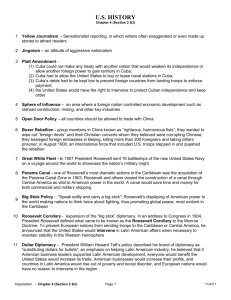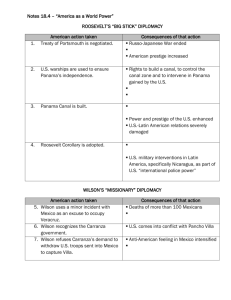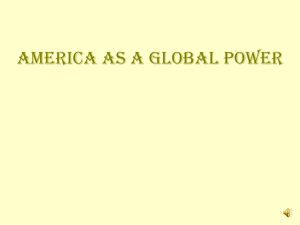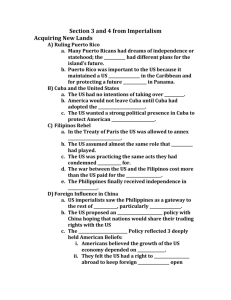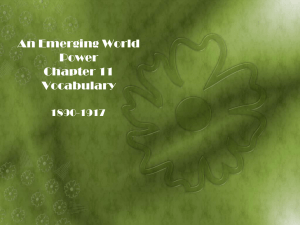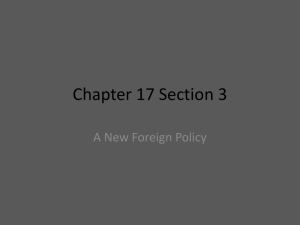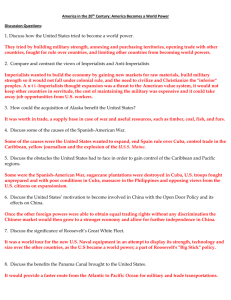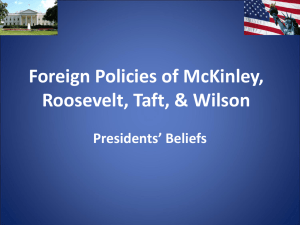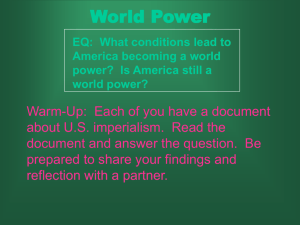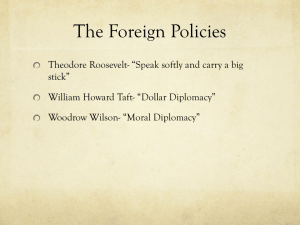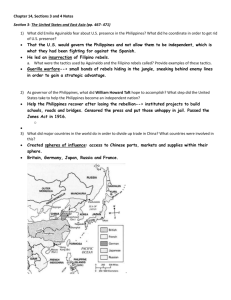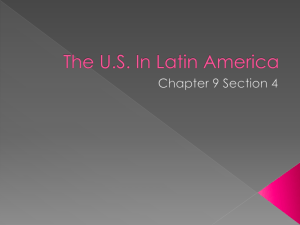Chapter 7 Lecture
advertisement
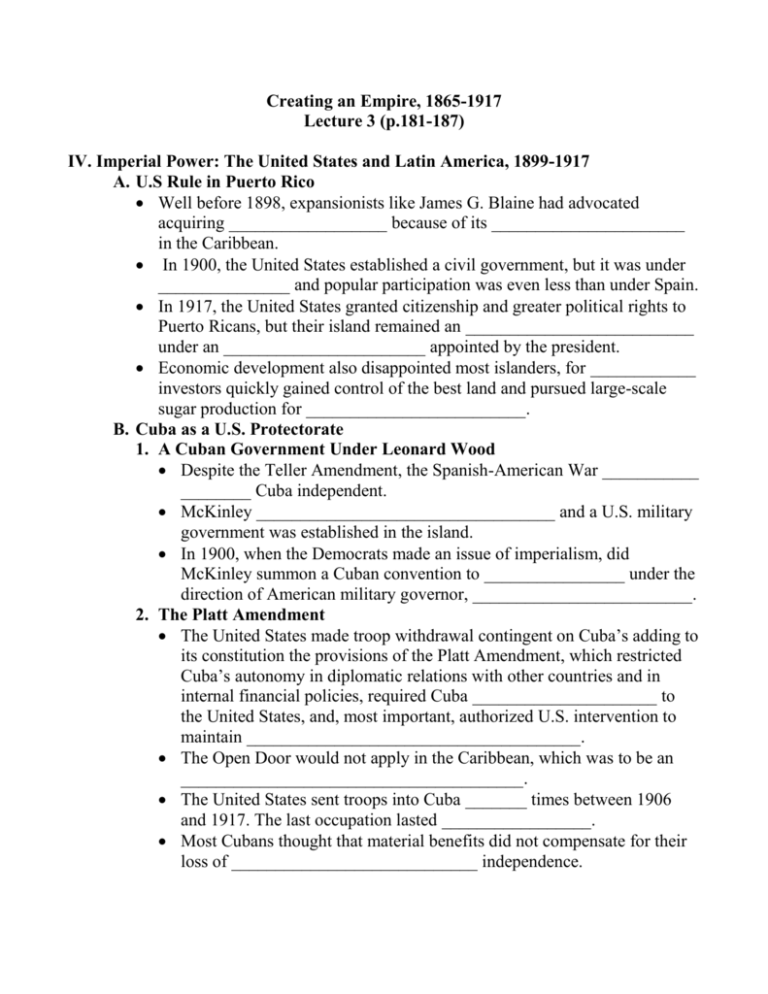
Creating an Empire, 1865-1917 Lecture 3 (p.181-187) IV. Imperial Power: The United States and Latin America, 1899-1917 A. U.S Rule in Puerto Rico Well before 1898, expansionists like James G. Blaine had advocated acquiring __________________ because of its ______________________ in the Caribbean. In 1900, the United States established a civil government, but it was under _______________ and popular participation was even less than under Spain. In 1917, the United States granted citizenship and greater political rights to Puerto Ricans, but their island remained an __________________________ under an _______________________ appointed by the president. Economic development also disappointed most islanders, for ____________ investors quickly gained control of the best land and pursued large-scale sugar production for _________________________. B. Cuba as a U.S. Protectorate 1. A Cuban Government Under Leonard Wood Despite the Teller Amendment, the Spanish-American War ___________ ________ Cuba independent. McKinley __________________________________ and a U.S. military government was established in the island. In 1900, when the Democrats made an issue of imperialism, did McKinley summon a Cuban convention to ________________ under the direction of American military governor, _________________________. 2. The Platt Amendment The United States made troop withdrawal contingent on Cuba’s adding to its constitution the provisions of the Platt Amendment, which restricted Cuba’s autonomy in diplomatic relations with other countries and in internal financial policies, required Cuba _____________________ to the United States, and, most important, authorized U.S. intervention to maintain ______________________________________. The Open Door would not apply in the Caribbean, which was to be an _______________________________________. The United States sent troops into Cuba _______ times between 1906 and 1917. The last occupation lasted _________________. Most Cubans thought that material benefits did not compensate for their loss of ____________________________ independence. C. The Panama Canal The Spanish-American War intensified the long American interest in a ____ ______________________________ to eliminate the lengthy and dangerous ocean route around South America. Theodore Roosevelt ______________________ to implement McKinley’s commitment to a canal after becoming president in 1901. Instead of using direct force, Roosevelt worked with Phillipe Bunau-Varilla, a French official of the Panama Canal Company, to exploit long-smoldering Panamanian discontent with Columbia. The bloodless “revolution” succeeded when U.S. forces ____________________________________ in Panama. Bunau-Varilla promptly signed a treaty accepting Roosevelt’s original terms for a canal zone and making Panama a __________________. Roosevelt boasted, “I took the Canal Zone and ___________________,” but his unnecessary and arrogant actions generated _________________ among Latin Americans that rankled for decades. D. The Roosevelt Corollary To protect the security of the canal, the United States __________________ ___________________in the Caribbean. In his 1904 annual message to Congress, Roosevelt announced a new policy, the so-called ____________________. The Monroe Doctrine had expressed American hostility to European intervention in Latin America; the Roosevelt Corollary attempted to ______ U.S. intervention and authority in the region. Latin Americans ________________________________ the United States’ unilateral claims to authority. E. Dollar Diplomacy Roosevelt’s successor as president, William Howard Taft, hoped to promote U.S. interests without such _______________________________________. He described his plan as one of “________________________________” – using government action to encourage private American investments in Latin America to _______________________________, and gain profits for American bankers. But Taft employed military force __________________ than Roosevelt had, with Nicaragua a major target. ________________________, not social and economic improvement promised by dollar diplomacy, kept Nicaragua’s minority government stable and __________________ to the United States. Dollar diplomacy _________________________________ in the Caribbean and tied underdeveloped countries to the United States economically and strategically, but this policy ______________________________ for most Latin Americans. F. Wilsonian Interventions 1. Wilson’s “missionary diplomacy” Taking office in1913, the Democrat Woodrow Wilson promised that the United States would “never again seek one additional foot of territory by conquest” but would instead work to promote “____________________ _______________________________________” in Latin America. Nonetheless, Wilson believed that the United States had to ___________ its exports and investments abroad and that U.S. dominance of the Caribbean was _________________________________. He also shared the racist belief that Latin Americans were ____________ _________________________________ from the United States, through military force if necessary. 2. Haiti In 1915, Wilson ordered U.S. Marines to Haiti. The U.S. Navy selected a new Haitian president, but real authority rested with the American military, _______________________________, protecting a small elite who cooperated with foreign interests and exploited their own people. In 1919, marines suppressed a revolt against American domination, killing more than ______________________ Haitians. 3. The Dominican Republic In 1916, when the Dominican Republic refused to cede control of its finances to U.S. bankers, Wilson ________________________________ _________________________. The marines ousted Dominican officials, installed a military government to rule “_____________________________________” and ran the nation until 1924. 4. Mexico In 1913, General Victoriano Huerta sized control of the country from _________________ who had recently overthrown dictator Porfirio Diaz. Wilson hoped to bring the _______________________________ to secure Mexico a better government under which all contracts and business concessions will be safer than they have been.” In 1916, Wilson ordered troops under General John J. Pershing to ______ ___________________________ into Mexico, leading Carranza to fear a permanent U.S. occupation of northern Mexico. On the brink of a full-fledged war, Wilson finally ordered ____________ ______________________________ and extended full recognition to the Carranza government.
